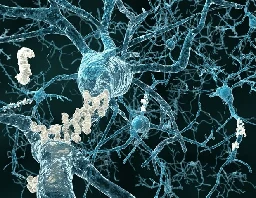Well—could be any one of a number of things. Article clearly states (and I'll second) that this isn't a comprehensive checklist that points only to dementia.
I'm not going to say what else it might be, as there are so many possibilities. That could generate a raft of options for a total hypochondriac meltdown set of things to worry about.
I will add that partner's medical & psych team ran through a whole bunch of other options, and none of the obvious meds, counseling, physical tests seemed to help or point anywhere else.
It's a list to pursue seriously with healthcare providers, though.
TLDR: This list does not automatically mean someone has dementia—other causes may include drugs, stress, mental illness, or other medical conditions. Seek medical help before jumping to conclusions.
- Apathy: nothing is interesting.
- Affective dysregulation: sad, anxious, crabby.
- Lack of impulse control: frustrated, angry, irrationally stubborn, obsessive.
- Social inappropriateness: shockingly uninhibited or rude in words, deeds.
- Abnormal perceptions or thoughts: suspicious, hearing or seeing things that aren’t there.
I wish I’d had this article 10 years ago. 20/20 hindsight, my partner in her early 50s went through years of prodromal (beginning signs of) Alzheimer’s before receiving a diagnosis at age 61. The list is scary-accurate.
Been there, done that. I probably had Covid twice, but one seemed asymptomatic. (Fully vaxxed each time.) The first time, had only a household member with Covid and some low blood-oxygen readings. The second time, felt like a bad case of flu, tested positive.
Covid seemed to linger for a longer time than most other viral infections I've had. Low energy, draggy, for a good month or two after I was physically "recovered." That I needed to self-quarantine, and my inability to get basic ADLs (activities of daily living) done efficiently contributed to feelings of depression. There was probably also a physiological Covid-related component to my feeling overall "down" as well.
It will pass, eventually (fingers crossed). It just seemed to take longer than run-of-the-mill illnesses. Be gentle with yourself.
Alzheimer’s is a disease that can take 20 years or more to run its serpentine course. Experts say the pathology...

A very beautifully moving, articulate first-person piece by Greg O'Brien, a journalist with Alzheimer's.
I cannot give you a TLDR, because this piece offers the texture, the experience, of what it's like to live with Alzheimer's. He says, "when the brain fails: write and speak from the heart, the place of the soul."
And for heaven's sake, start an investment retirement account now. Yeah, I know, "but I'm not making enough, but there's that shiny thing in the (online) store window, but I'm never going to get old." Just allot one take-out coffee's worth of spare change per week. You can up the ante later. Let the miracle of compound interest do its thing.
Welcome to for-profit healthcare in America. It's no longer about your health. It's about their profits. (But—muh freedomz!)
That you're posting here suggests you really don't want to take action. That's a good start.
I urge you to seek professional counseling to work on processing this horrible experience. It won't go away if you follow through with violent plans. While you may feel like it would release your from the "prison of your mind," I can assure you it will not. And you're more likely to find yourself if literal prison.
I was raped when I was 17. I've never said thst anywhere in print, and rarely speak about it in person. I'm 68 now. I recall the details vividly.
I'm saying it now to you so you know I am speaking from hard experience, not just blathering. Revenge will not release you. And: you will be shaped by the experience. You cannot change that. But far more importantly, you do not need to be defined by it.
I refuse to have my life defined by one stupid person's thoughtless, egregiously cruel act (or even several people, several acts). You are better than that, stronger than that. I refuse to give anyone that power. It's not about forgetting anything. It's about forging it through your own will into one event, among many, that make you who you are, and who you can be.
TLDR: Some studies on what causes Alzheimer’s disease are examining the link between the early presence of one of the hallmark chemical brain chemicals (plaques—or clumped buildup—of the protein beta-amyloid) and later development of the disease.
People 18 to 65 who experience high stress, anxiety and depression seem to have greater amounts of this marker protein, and statistically greater risk of developing Alzheimer’s in later years.
Does untreated mental illness tend to cause higher rates of Alzheimer’s? Does impending Alzheimer’s (accompanied by increased beta-amyloid) cause mental health issues? Can early intervention lessen the risk of developing Alzheimer's later? Is the connection mere coincidence?
The cause-and-effect connection is still unclear. (Caveat: No, if you’re depressed, this does not mean you’re headed for dementia-land.)
I can attest to my own experience with my partner, who was officially diagnosed with early-onset Alzheimer’s at age 61. She had about a decade’s worth of whack-a-doodle mental health issues prior to the diagnosis. None of the conventional therapies (drugs, counseling) seemed to work.
We know she had a hereditary predisposition (her father and 2 aunts had some form of dementia). We know she had a childhood that caused anxiety and depression. Perhaps it was a snowball effect—the biochemistry of mental health issues poking and prodding the genetic component into action. Or perhaps the mental health and Alzheimer's symptoms merely overlapped.
Some further reading on current research into links among beta-amyloid, mental illness and Alzheimer’s:
https://www.ncbi.nlm.nih.gov/pmc/articles/PMC8534102/
https://pubmed.ncbi.nlm.nih.gov/25629787/
https://pubmed.ncbi.nlm.nih.gov/34877794/
An occasional thought that flits by, dissipates quickly, likely not an issue. But by definition, "intrusive" means a thought that nags, disrupts, is unwelcome in frequency, intensity. It would be worth finding a therapist to get to the reason, the source—and to find better ways to defuse or address these thoughts. They aren't there "for no reason at all." With a clearer sense of the reason, you can seek better ways to address the root cause.
Can't do tech very well, but give me needle, thread, and I can mend! Nobody does that anymore, either.
There’s a test for that: the Holmes and Rahe Stress Scale. You can look up that term online for more information. I’ve linked to one source that has a decent, short explanation, and the complete scale itself. Other sites can offer more in-depth perspective.
You may need to adjust some of the items for your specific circumstances. Note that the scale indicates that even “good” stuff in our lives (as well as, duh, “bad” stuff) can contribute to overall feelings of being off-kilter, out of it, not quite firing on all cylinders.
There are a number of resources pinned on this community for those in need of extra help.
Much love, sympathy, condolences. I know this was very hard for & on you. Thank you for sharing the update; we are honored.
I'm so glad you took the time to update! It sounds like, although it was an unpleasant experience, you made good use of it by figuring out what was behind the feelings, what was motivating your downward spiral, and what you can do to help yourself get back on track.
I know it's easier said than done, and something I struggle with too—but don't let the perfect become the enemy of the good. As in, maybe you'll try and not get it absolutely perfect. But doing a "good enough" job is sometimes (often?) better than doing nothing at all. We all make mistakes, even with the best of intentions and effort. But the only real "failure" is screwing up, and not learning anything from it. I think it was Einstein who said "The definition of insanity is doing the same thing over and over again, and expecting different results."
Thank you for asking how I'm doing! Well—muddling through. Sitting in a nursing home with my partner who has Alzheimer's, where I visit her every day. Not what I wanted for my retirement. I try to look for good things, small things. She still knows who I am, and we still love each other. I'm comfortable financially. I'm going to see my friends in church tomorrow; hopefully, the meditation class I'll be teaching will go over well. Trying to get motivated to mow the yard!
Be well, my friend, and take good care of yourself. We all have ups and downs; give yourself what you need to pick yourself up again.
Absolutely! Toasted, with ketchup!
Sorry, absolutely no clue—like at least 30-40 years ago.
Sleep tight. Don't let the bedbugs bite. And if they do? Bite them back!
I hear this! Mine now tries to snuggle up by shoving his butt toward my face, and draping his tail across my mouth.
I've read about a variation of this and do it faithfully! Except you have to be driving under an overpass with train tracks, and there has to be a (preferably moving) train on the tracks above you. The idea is that when you press your hand to the car's ceiling, you get to send a wish to hitch a ride on the train going by above you. The moving train takes your wish along with it, giving it quicker travels, more exposure to the world, and thus more opportunities to be fulfilled.
Nursing home operators facing criminal and civil charges for health care fraud and unfair labor practices are now being accused by the federal government of trying to sell off assets prior to trial to avoid any financial judgments that may be imposed. Comprehensive Healthcare Management Services fou...

This article concerns one of the part-owners (19% share) of the skilled nursing facility my partner with Alzheimer's is in. His name is Ephram Lahasky. The place is Comprehensive Rehabilitation and Nursing Center at Williamsville, NY. (I call it the Roach Motel.)
The article notes that he owns a similarly-named nursing home conglomerate in western Pennsylvania. That conglomerate is trying to sell off properties.
In a nutshell, the conglomerate has cheated workers, patients and Medicare/Medicaid. It's trying to sell off properties before a judgment is rendered in the lawsuits, so it won't be liable. These are allegations only, not established fact—but yeah, where there's smoke…
Beware placing anyone in a nursing home where this guy is among the owners. Many nursing homes are a shady exercises in profiteering.
Almost anyone can take this quick test for Alzheimer’s without even going to the doctor. Some neurologists are saying it’s a terrible idea.

“Why Neurologists Are Calling Quest Rapid Alzheimer’s Test ‘an Absolute Catastrophe’”
TLDR by a real person:
Quest Diagnostics has released its Quest AD-Detect™ blood test for $400.
Problems:
-
The test has a high rate of false positives—29% false positives.
-
Tests are easy to misinterpret. They only tell you if you MIGHT get Alzheimer’s… with a 29% false positive rate.
-
The test looks for beta-amyloid proteins, one hallmark of Alzheimer’s. But the buildup of these proteins hasn’t been studied in a large enough cross-section of the population to lead to any conclusions.
-
Symptoms that look a lot like Alzheimer’s can be caused by a wide range of other things. If you misinterpret the test as meaning you have Alzheimer’s, you could miss some other serious conditions.
I read your post a couple of hours ago, and thought about it--and I'm so glad you've been able to make some moves toward resolution.
One thing I keep thinking about, which you may not have had a chance to address: what is so troubling about the application?
Does it lead you to activities you don't want to perform? That is, if your application is accepted, and you complete the tasks that you've applied for, will you be happy, satisfied, fulfilled during and after those activities? Perhaps you have some deep sense that you don't want to go where this application takes you. Or perhaps your stumbling block is fear of failing at the tasks once you are admitted. Perhaps even your subconscious resistance is symbolic--it's a next step in growing up, moving on to the next phase of your life, and that brings all sorts of uncertainties, worries, opportunities to experience problems.
In any event, I think you've found one key to getting through the mental block: you broke the cycle by doing something (anything!) that breaks the pattern--getting out for a walk and a tram ride. Hooray!
Another key, I think, is that you mention missing doses of medication. Psych meds can do strange things to the mind, and sometimes (as you point out) the body/mind needs to adjust and ride out the change. Skipping doses can make you "think things you're not really thinking"--can shift brain chemistry in ways that make you believe the mental states are arising internally, when in fact they are chemically induced. Skipping doses can play havoc with your mental state. If the meds aren't working, or seem to be creating more problems than they solve, by all means ask your psych for a change--but it's not helpful to change the schedule of dosing just because you feel (or don't feel) like doing so.
The Dutch “dementia village,” De Hogeweyk, discussed in a paper delivered at the annual meeting of the Society of Architectural Historians:
https://www.e-flux.com/architecture/treatment/410336/deception-and-design-the-rise-of-the-dementia-village/
An Al Jazeera video on a care home in the northern Thai city of Chiang Mai:
https://www.aljazeera.com/program/101-east/2020/5/1/thailands-last-resort/
From my (unwritten, mostly mental) gratitude journal:
My partner has Alzheimer's, and is in a nursing home. Can't walk, feed herself, needs more care than I can personally supply or round up for home-care.
But: I am grateful she still recognizes me, knows that I love her dearly, and can carry on a basic, simple conversation. I am grateful her nursing home's union negotiated a new contract with pay- and staffing-level increases. I am grateful that her wing has a new unit manager who seems more able to do the hard work of keeping the cats (aides & patients both) herded. I am grateful I have the ability to visit daily. I am grateful for those who support me IRL and online.
Paying someone a simple, spur of the moment compliment, when they seem pretty happy already—and then realizing from the expression on the recipient's face that it really meant a whole lot more to them than you thought it would.
And to hear those children laughing, and a bunch of other stuff to cheer you up: https://www.peptoc.net/hotline. (Free "warm line" with pre-recorded messages—from kids!)
First—wow. You’re living an incredibly full life. You’re meeting the situation you’re in by working two jobs; looking toward the future with the university degree. You have an admirably balanced portfolio of purposeful avocational activities to meet spiritual, physical and social needs. You’ve thought out and researched how mind and body work.
But I find myself wondering: “But when do you dream?” I’m not referring to sleep-dreaming. Rather, I’m thinking of something more like meditation—where the mind is either not engaged in purposeful activitiy, or is engaged in activity that is so rote, so engrained as automatic, that the subconscious is free to make its own associations that (for lack of a better descriptor) allow it to connect the dots from what seem to be disparate experiences.
I’m a (retired) academic. You mention you’re progressing further in university studies. You don’t describe it as onerous in terms of literal time commitments: absorbing material, completing tasks that assess subject mastery.
My experience has been that intensive intellectual processing seems to drain some sort of subconscious reservoir, which then demands to be replenished. If I do not give this process its due, eventually I become a gibbering idiot; for lack of a better term, I think of it as “brain-lock.” If I try to push through, I make stupid mistakes. Like the day I woke up, cleaned my contact lenses like I had done for some 20 years, and tried to pop them in my eyes using the soap solution instead of the wetting solution. I burned my eyes so badly I had to take the day off. (No long-term harm—just serious ouch.)
Another consideration: You don’t say how old you are; some details you mention suggest you’re beyond early 20s. Specifics aren’t particularly important. I’m old enough to be retired. So here’s the point: as we age, the balance of body-mind-spirit components we need will change. I find that I need more “free-range” mental/emotional time to recover from stressful situations. Perhaps that is also so for you.
I don’t know what components you may want or need to shift in your schedule. But since you’ve asked what’s going on, I’ve offered my best guess on what you might need to assemble your own answer.
Yes. This is the basic driving style on the Katy. No rules, no lanes. Just wide open spaces, bumper to bumper at a minimum of 75 mph. On a good day.
I don’t want to claim that meditation is the answer to every mental health problem. But it’s helped me, and I sometimes recommend trying it, particularly mindfulness. (And you can do mindfulness seated and at rest, or walking, or any number of routine activities—just not driving, please!).
I’ve heard a number of people say “But I just can’t still my thoughts! My mind is racing, and I give up feeling more defeated than ever!”
Mindfulness is not about forcing your mind to stop thinking. Rather, it’s about becoming aware of what you’re thinking… and then letting the thought go.
I’ve linked an article I found recently that explains it really well. TLDR (though it’s worth reading in full): A Tibetan Buddhist monk, chosen as the reincarnation of a revered predecessor, absolutely loathed being a monk as a teenager. He was angry, snarly, irritated, and a great vexation to his teachers. Angry thoughts constantly interrupted his meditation practice (and everyone around him).
One teacher gave him some advice: when you meditate, don’t be like a dog; be like a lion.
---
“When you throw a stone at a dog, what does he do?” he asked.
“The dog chases the stone,” I replied.
He said that was exactly what I was doing, acting like a dog—chasing each thought that came at me…
“When you throw a stone at a lion,” he continued, “the lion doesn’t care about the stone at all. Instead, it immediately turns to see who is throwing the stone. Now think about it: if someone is throwing stones at a lion, what happens next when the lion turns to look?”
“The person throwing the stone either runs away or gets eaten,” I said.
“Right you are,” said my teacher. “Either way, no more stones!… Instead of chasing the anger, grabbing it, and holding on, just be aware. Just be very gently aware of the anger instead of getting involved. Don’t reject it, but don’t dwell on it either. Just turn your attention to look gently at the thought. At that moment of turning inward to just observe, the thought will dissolve. At that moment, just exhale and rest.”
Deborah Hersh of Curtin University in Western Australia shares strategies to best support individuals living with aphasia.

TLDR (by a real person!):
Aphasia is the inability to put one’s thoughts into the right words—you know what you want to say, but brain damage (traumatic brain injury, tumors, dementia, etc.) derail conversations. It can be isolating and maddeningly frustrating.
How to talk to someone with aphasia
-
Acknowledge capacity. People with aphasia remain smart, capable—but there’s a short-circuit in expressing thoughts.
-
Partner up. It takes two to talk. With a few strategies, you can ease the way for satifying conversations. Keys: • Speak normally—tone, volume. • Acknowledge stumbling blocks with respect, rather than ignoring them. • Write down (or repeat) key words to keep chat on track. • Draw, or use gestures; point; use more body language. • Use yes/no questions to confirm understanding. • Sum up main points at intervals.
-
Respect the human right to communicate. Written or spoken language is a hardwired need.
-
Ensure accessibility. Make sure speed, loudness, complexity of information (etc.) allow for comprehension, participation.
-
Include people in conversations and events. Don’t leave people out because you assume they might feel uncomfortable. Offer choices and they will tell you.
Researchers at the Francis Crick Institute and UCL have shown that hundreds of proteins and mRNA molecules are found in the wrong place in nerve cells affected by Motor Neuron Disease (MND), also known as Amyotrophic Lateral Sclerosis (ALS).

"Researchers at the Francis Crick Institute and UCL have shown that hundreds of proteins and mRNA molecules are found in the wrong place in nerve cells affected by Motor Neuron Disease (MND), also known as Amyotrophic Lateral Sclerosis (ALS).…
[N]ew research published today in Neuron shows that the problem is much broader. This 'mislocalization' affects many more proteins than first thought, especially those involved in RNA binding. The mislocalization extends to mRNAs too, molecules that deliver instructions to make proteins from the DNA in the nucleus."
New tools for early detection and prevention in progress.
Blood test: https://www.reuters.com/business/healthcare-pharmaceuticals/quest-diagnostics-launches-alzheimers-blood-test-consumers-2023-07-31/
Vaccine: https://neurosciencenews.com/vaccine-alzheimers-23722/
Gut microbiome: https://www.nia.nih.gov/news/changes-human-microbiome-precede-alzheimers-cognitive-declines
Protein markers in genetically-transmitted Alzheimer’s: https://www.alzforum.org/news/research-news/proteomics-discerns-sporadic-familial-alzheimers-disease
File a claim to participate in the No Proof Required $56 Million Alzheimer's Namenda and Memantine Price-Fixing Class Action Lawsuit

Dementia / Alzheimer's Medication Class Action
"A $56 Million Class Action Settlement has been settled with pharmaceutical companies that manufacture and market certain Alzheimer's disease medications. The class action lawsuit alleged that pharma companies including Actavis, Merz, Teva, Dr. Reddy's, and Wockhardt conspired intentionally to keep generic versions of Alzheimer's medication off the shelves in order to drive up the cost of Namenda Alzheimer's medication. In the United States, the generic version of Namenda Alzheimer's disease drug is also known as Memantine."
Page contains a link to join the class action suit.
Black patients and other minorities tend to be diagnosed at later stages of the disease, which would exclude them from use of Leqembi. Few Black people were included in the main trial of the drug.

Racial disparities in drug trials, and disparities in overall medical care, among other factors, make the recently-approved Alzheimer's break-through drug lecanemab less likely to benefit African Americans.
After the passage of the ADA, much of the media coverage focused on litigation and whether or not certain disabled people “deserved” accommodations.

Interesting read on how media portrayal of people with disabilities shapes perception of them as "deserving" of accommodations under ADA, or not.
Covering the latest Alzheimer’s disease and dementia news through journalism, patient perspectives, and exclusive interviews with leading experts.
From their "about us" page: "'Being Patient' is an editorially independent news and community platform that aims to create clarity around complex health issues and be a trusted, accurate source of information for the people impacted by a disease."
Some good, apparently well-vetted info on Alzheimer's and related dementias. Emphasis on personal narratives from people with dementia, and from caregivers.
They all have a 50-50 chance of inheriting a cruel genetic mutation — which means disappearing into dementia in middle age. This is the story of what it’s like to live with those odds.

"The Vanishing Family." This is a "gift" link, so you shouldn't hit a paywall; let me know if you have any problems.
Advancements in technology and practice reported for the first time at AAIC 2023 demonstrate the simplicity, transportability and diagnostic value of blood-based biomarkers for Alzheimer's, including the future potential for at-home testing by a patient or a family member.

So my partner with Alzheimer’s is in a skilled nursing facility. She wouldn’t walk or exercise for several years; fell repeatedly; and after a stint in the ER, flunked out of rehab. She’s now in long-term care on Medicaid, in a place which I will call Roach Motel because (you know) “roaches check in, but they don’t check out.” They want her money. I am physically unable to care for her at home 24/7.
I don’t know that I could have gotten her into a better place than Roach Motel from a hospital ER. The ER was adamant: “we need to kick her out NOW, because she’s taking up space and we can’t do anything more for her. You have two choices, and they’re both wretched. Roach Motel is slightly less wretched.”
I didn’t know much about Roach Motel, but I document here how I was able to find the skeletons in their closet, in hopes someone with more time to consider can avoid voluntarily selecting a toxic waste dump for their loved one. Presumably, this roadmap will work for assisted living, memory care, and other types of care facilities too. This strategy works for the US; I believe it should be transferrable to other countries.
Yes, ideally you should visit, do the sniff test (does eau-d’-urine waft through the halls?), ask questions (do you treat patients with respect?), sample the food (it’s all institutional, but is there some semblance of palatable, recognizable food items?) However, good places will be honest, and garbage dumps will show-and-tell you what they want you to see. They will appear similar. How to tell the difference?
You can coax a lot out of online searches.
First, start with the facility’s full proper name; add city and state if necessary. Search online. You can use Google’s search engine for this first part—but for later searches, I suggest something like DuckDuckGo. Reason: some search engines accept pay to promote good reviews, suppress bad ones. It’s called SEO, “search engine optimization.” You want to see what they will pay not to show you.
Your first search results will show you the puff pieces: the glossy-brochure language, promotional articles, glowing (likely paid) customer reviews.
Next, add the following to your search string: "Medicare Medicaid." It doesn’t matter whether you have either in your healthcare portfolio. Both programs review and rate facilities based on complex metrics. Scroll through the resulting pages to see what the criteria mean, what they are based on. Pay some attention to consistency of ratings—if one month, they are at 5 stars (out of 5), the next month jump to 3, back up to 4, and a month later drop to 2, then they’ve got issues.
Next, use the facility name and add strings such as "complaints," or "reviews." The Yelp-style ratings system will always skew to extremes; they elicit comments from people who are either deliriously happy, or inconsolably angry. Take both with a grain of salt. Sometimes, a patient’s medical issues will overwhelm even the most meticulous of care, and that can leave loved ones looking to assign blame. But if you see a bunch of ambulance-chasers boasting of success “suing the pants off” of your facility, it’s not a good sign.
Next, using facility name, switch over from the “general” tab of your search engine to “news,” and sort by “most recent.” What does recognized journalistic reportage have to say about your facility? You may find reports of union strikes, egregious heath and safety violations. Or you may find the C-suite honcho or top manager bragging, prognosticating a bright future for happy patients with excellent care. Are the honcho’s comments realistic? Does it appear he or she thinks an increase in Medicare or Medicaid per-diem payments will fish them out of their current financial morass? (Ha! Dream on!) Read between the lines; why is this piece of reporting “news”? What is the honcho responding to? Bottom line, what pending financial instabilities do you see? (If they have problems looming, those problems won’t be reported; they’re speculation, not yet actual news. Make some intelligent guesses of your own.)
Finally, use the facility name and add "owner", searching with the “general” tab. The dirty little secret of most nursing homes is that they are for-profit entities, and that they are owned by a handful of people who are very well-off, and who bring family and friends into the business with them. Whatever their values, they will likely be applied to (and visible in) other facilities in which owners have s share.
From what I’ve seen, there may be a dozen or so owners. Each one owns a percentage share of your target institution, and a percentage share of many other institutions across the country. They’ve got empires going. One I read about purchased a whole airline for his son to play at running—where did that money come from?
Pick a few names from the top of the list, and start online searching those names. (If names are common, you may have to toss in a few qualifiers like “nursing.”) The people at the top have the biggest percentages. Chances are, you’ll start seeing other names appearing on the sites you turn up—the other co-owner investors listed as owners.
What kinds of complaints, fines, lawsuits, violations, fraud, allegations or similar shenanigans do you see? The owners of your target facility almost certainly have shares in other facilities that have done bad enough things to become internet-searchable. If your target facility is not currently under the gun, that’s not necessarily good news. Chances are excellent they simply have not been caught and publicized yet. An owner of multiple facilities is not going to treat your target facility any differently than all the others they own.
And for 50 extra bonus points: set up a Google Alert. Search online for "Google alerts." Sign in to your Google account. In the dialog box “search for,” enter the full name of your target institution. My preferences from drop down menus (set to default unless otherwise indicated): how often—once a day; region—US; how many—all results. (If you get irrelevant info, you can modify these settings later).
I was on Farcebook earlier today, and caught not one, but two ads using the hashtag #dementiaawareness. (I was looking for something else.) I reported them to Farcebook as lies, and they disappeared, so sadly I can't share screenshots.
But basically, y'all know the drill: "Did you know you can cure dementia with this one simple thing?" I had to double-check—yup, it was "sponsored content." Someone paid to put it there.
Clicked through to a long rambling bunch of yadda yadda, coming from a Very Important MD with Very Big Credentials (you can read that in tRump's voice if you wish…), who has seen through the falsehoods of conventional therapies. Yes, all of the side-effects which the (white, male, pretty-boy) doctor lists for donepezil are truthful. Similar padding and truthful (but partial) information about other established medical interventions.
After pages and pages of half-truths, we get to the point: all you have to do to permanently reverse and cure dementia is buy our cannabis gummies! Here is a picture of Jane Doe with dementia, and here is a picture of Jane Doe after just one week taking our gummies! Wow!!!
Alzheimer's Association national site – information on Alzheimer's disease and dementia symptoms, diagnosis, stages, treatment, care and support resources.

Alz.org is the website for the US based Alzheimer’s Association. They focus primarily on Alzheimer’s, but also contain some material on other forms of dementia.
The site interface is designed to be easy to navigate for those who are not medical professionals, but digging through some of the menus will get you to refereed journal articles and other professional resources, as well as granular suggestions for caregivers seeking to offer dignified, appropriate levels of support for loved ones.
Of special interest: their phone hotline, available 24/7. From my experience, they seem to have a vast phone-tree of specialist consultants—so you can call in to vent, ask for tips and strategies, or to get pointed in the right direction for independent research.
I was especially impressed with their ability to get me connected to local resources—lists of adult daycare, nursing homes & memory care, checklists on how to evaluate offerings, and so on. So often, I’ve asked for help through insurance company reps, or doctors’ offices, or dug up stuff myself online—only to find it’s outdated or contains information that isn’t useful.
I started on Beehaw, moved to Lemm.ee, and am now moving to LemmyWorld (all as 108beads). The reason is technical issues with what tools are allowed to me for modding tasks. The communities I mod are on LemmyWorld, so my account needs to be on LemmyWorld.

